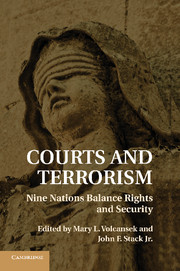Book contents
- Frontmatter
- Contents
- Contributors
- COURTS AND TERRORISM
- Introduction
- 1 Detentions and Security versus Liberty in Times of National Emergency
- 2 One More Casualty of the “War on Terror”
- 3 State Secrets and Democratic Values
- 4 What Lessons Can Be Drawn from a Sui Generis Case? The Global “War on Terror” and Northern Ireland
- 5 The British Experience with Terrorism: From the IRA to Al Qaeda
- 6 Detention and Treatment of Suspected Terrorists under the European Convention on Human Rights
- 7 Australia's Commonwealth Model and Terrorism
- 8 Judicial Rejection as Substantial Relief: The Israeli Supreme Court and the “War on Terror”
- 9 Preserving Rights and Protecting the Public: The Italian Experience
- 10 Squaring the Circle? Fighting Terror while Consolidating Democracy in Spain
- 11 From Exception to Normalcy: Law, the Judiciary, Civil Rights, and Terrorism in Colombia, 1984–2004
- Conclusion: Lessons Learned
- Cases Cited
- Statutes Cited
- References
- Index
5 - The British Experience with Terrorism: From the IRA to Al Qaeda
Published online by Cambridge University Press: 05 July 2011
- Frontmatter
- Contents
- Contributors
- COURTS AND TERRORISM
- Introduction
- 1 Detentions and Security versus Liberty in Times of National Emergency
- 2 One More Casualty of the “War on Terror”
- 3 State Secrets and Democratic Values
- 4 What Lessons Can Be Drawn from a Sui Generis Case? The Global “War on Terror” and Northern Ireland
- 5 The British Experience with Terrorism: From the IRA to Al Qaeda
- 6 Detention and Treatment of Suspected Terrorists under the European Convention on Human Rights
- 7 Australia's Commonwealth Model and Terrorism
- 8 Judicial Rejection as Substantial Relief: The Israeli Supreme Court and the “War on Terror”
- 9 Preserving Rights and Protecting the Public: The Italian Experience
- 10 Squaring the Circle? Fighting Terror while Consolidating Democracy in Spain
- 11 From Exception to Normalcy: Law, the Judiciary, Civil Rights, and Terrorism in Colombia, 1984–2004
- Conclusion: Lessons Learned
- Cases Cited
- Statutes Cited
- References
- Index
Summary
The September 11, 2001, attacks on the United States prompted efforts by nations around the world to circumscribe some civil liberties to combat terrorism, and as Jeremy Waldron observed, courts were unlikely to oppose those reductions in freedom (2003: 191). Indeed, when faced with groups who are willing to employ unlawful violence strategically to advance political goals (Gross, 2006: 11), political panic becomes acute. Often, in that state of panic, to which judges are not immune, the first victims can be rights – rights of the criminally accused, of privacy, of speech, of press, of assembly, and even of life. Boundaries “between war and peace, emergencies and normality, the foreign and the domestic, the internal and the external” become blurred as terrorist acts transcend a single nation-state (Brooks, 2004: 676). Terrorism purposely and systematically induces “fear and anxiety to control and direct a civilian population” (Crenshaw, 1981: 380), and governments react as their constituents seek protection from elusive terrorists, often ones willing to lose their own lives to carry their message to a larger audience (Crenshaw, 1981: 379).
Many nations have confronted terrorism over the years and have fashioned various responses to this deadly phenomenon. This chapter considers the reactions of the highest courts of the United Kingdom to two different terrorist threats: first, the “Troubles” in Northern Ireland from 1969 until the end of the twentieth century, and then those more currently posed by the radical Islamist group, Al Qaeda.
- Type
- Chapter
- Information
- Courts and TerrorismNine Nations Balance Rights and Security, pp. 89 - 111Publisher: Cambridge University PressPrint publication year: 2010



